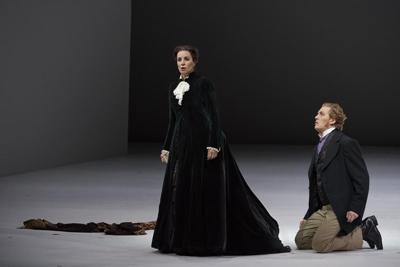Eugene Onegin
4 stars
Canadian Opera Company. Directed by Robert Carsen. Conducted by Johannes Debus. Until Nov. 3 at the Four Seasons Centre for the Performing Arts, 145 Queen St. W. or 416-363-8231
It has been 10 years since the Canadian Opera Company last presented Eugene Onegin. The quality of what we witnessed at the opening performance of its new production on Sunday afternoon proved that it was worth the long wait.
Peter Ilyich Tchaikovsky‚Äôs seven ‚Äúlyric scenes‚ÄĚ adapted from a novel-in-verse by Alexander Pushkin in 1879 received their full due ‚ÄĒ with a healthy dose of Canadian content. From the staging to the singing to the orchestra, everything was solid gold.
Essentially, the story is about misplaced love: a young woman from the country, Tatyana, falls in love with Onegin, a jaded, posh city dweller. He tells her he’s not interested. Years later, they meet again. Tatyana is now married and sitting atop the social ladder. Onegin sees what he passed up and asks Tatyana to run away with him. She says she still loves him but will remain true to her husband.
Onegin is crushed. It doesn’t help that he has ruined Tatyana’s sister’s happiness and killed her fiancé along the way. No one gets a happy ending, but bad news has rarely sounded this beautiful.
COC music director Johannes Debus shaped the score with great care and balance. There was transparency to the sound all the way through, paired with voluptuousness and muscle, as the occasion demanded.
The singers were wonderful, starting with Canadian bass-baritone Gordon Bintner in the title role. He was every inch the haughty urbanite in the beginning and fully captured the depth of emotional crisis at the end. The dots were connected smoothly, the character evolving naturally. And Bintner’s rich voice made that journey compelling.
Equally winsome was Canadian soprano Joyce El-Khoury’s Tatyana. She deftly navigated the arc from youthful passion to mature, steely resolve. She has a voice tailor-made for the composer’s melodic flights.
The rest of the cast was also strong, including Canadian tenor Joseph Kaiser as Lensky, Armenian mezzo Varduhi Abrahamyan as Tatyana’s sister Olga and even French character tenor Christophe Mortagne as Monsieur Triquet, who injects a lighter tone in the middle of the opera.
Canadian Michael Levine’s less-is-more set is one of the stars of this show. It may have been more than 20 years since this production first saw the glow of stage lights at the Metropolitan Opera, but its simple, geometric parameters and Robert Carsen’s psychologically astute direction not only keep the focus clear, they serve to enhance the underlying message of how constricting social norms were in the mid-19th century.
Jean Kalman’s lighting is nothing short of brilliant, taking over the work of regular scenery with colour. And Levine’s opulent costumes inject just the right amount of visual richness.
The inherent drama in Eugene Onegin is fairly slack until we get to the halfway point. But just when we think we need a dash more emotional momentum, we suddenly discover that the opera has grabbed us by the heart and isn’t about to let go. This is a journey to savour.



























To join the conversation set a first and last name in your user profile.
Sign in or register for free to join the Conversation